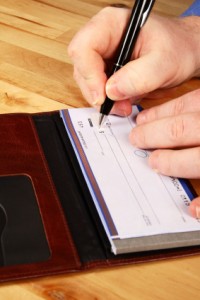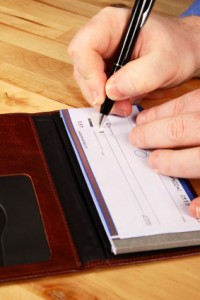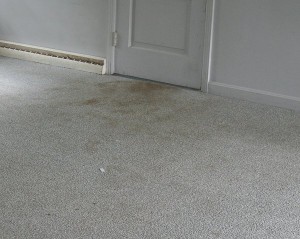Posted by Teresa on March 5, 2010 under Landlord and Tenant FAQs, Tenant Screening & Background Checks | 
 Verifying a tenant’s employment history and income is a vital step to approving his or her application. The unfortunate economic situation makes it even more important; while many good people have lost their jobs through no fault of their own, your tenants still need to pass your litmus tests, including meeting minimum income requirements.
Verifying a tenant’s employment history and income is a vital step to approving his or her application. The unfortunate economic situation makes it even more important; while many good people have lost their jobs through no fault of their own, your tenants still need to pass your litmus tests, including meeting minimum income requirements.
Here are five reasons to verify employment and income on potential tenants:
1. Because landlords and property managers must know that each tenant who signs a lease agreement can live up to its terms—including paying the security deposit and upfront fees, plus the rent in full each month. Whether the tenant will pay on time each month is certainly not guaranteed—but you need to know whether they even have the capability before you sign a lease.
2. Because even if the tenant has the upfront fees ready to hand over, you’ll want to know if their employment history is solid. Holding a job is no guarantee that a tenant will pay rent on time, but it helps!
3. Because verifying the source of a tenant’s income is a great way to prevent those engaging in illegal activities from becoming your problem. In other words, if a tenant has plenty of cash but no job, be suspicious. Same for obvious high spending with a low income. It is not discriminatory to ask a tenant to prove how much money they make. Remember: pay stubs are your friends.
4. Because tenants sometimes go to great lengths to pull a fast one on a landlord. Just because they say they’re working for Jones Construction Company doesn’t mean they do. Ask for proof. Call the supervisor—and make sure that when you do, you’re actually speaking to the supervisor, not a friend pretending to be one.
5. Because knowing that your new tenant is stable and can afford the rent is one less worry for you. And landlords and property managers need to reduce worries as much as possible!
Posted by Teresa on March 2, 2010 under Landlord and Tenant FAQs, Rents and Deposits | 
 While some landlords avoid bounced checks by requiring cash or money orders from tenants, most still accept checks—and the risk that goes with that. Studies show that while the number of online payment options grows, the number of checks being written is declining. Still, plenty of folks pay their bills—including rent—with checks.
While some landlords avoid bounced checks by requiring cash or money orders from tenants, most still accept checks—and the risk that goes with that. Studies show that while the number of online payment options grows, the number of checks being written is declining. Still, plenty of folks pay their bills—including rent—with checks.
What are your options when a tenant’s check is returned by your bank?
Depending on the state in which you do business, writing a bad check can range from a misdemeanor to a felony. And, bad checks can be treated by law enforcement as a serious matter—or as a nuisance. Follow these steps to avoid the need to involve your local police or sheriff’s department.
- The first thing most landlords do is to demand full payment from the tenant, including the amount of the check, plus a handling fee. Make sure this fee covers any bank charges for returned checks and your bookkeeping time.
- Check your state and local laws to determine if there is a limit to the amount you can collect as a returned check fee. Some states allow for penalties and interest; others limit landlords to a flat fee.
- Give your tenant a time limit to pay in full. Many landlords and property managers begin eviction proceedings if they have not collected the full amount due by the end of the time limit.
- It is perfectly reasonable to require payment in the form of a money order or certified check—and to require subsequent rent be paid in the same way.
- If you charge a late fee for late rent, remember your tenant will be responsible for that if they pay in full after the agreed-upon date. So add it to the total tab.
- When drawing up lease and rental agreements, be sure to include a provision that covers your policy on returned checks. Include the compensation language, time limits, and late fees, and your requirements for money orders and/or certified checks.
Posted by Teresa on January 23, 2010 under Landlord and Tenant FAQs, Landlord Tips | 
Landlords, do you really know what’s going on inside your rental properties? Has a tenant ever surprised you with unacceptable (or illegal) behavior? How many of you have discovered evidence of an unauthorized pet—after the tenant moved out?
It only takes a quick scan of a newspaper to find the horror stories landlords and property managers must deal with: Woman found with 32 cats in studio apartment; Police raid methamphetamine lab in neighborhood home; Marijuana-growing operation in basement shocks neighbors.
As a landlord, you have the right and duty to inspect your rental properties. The right to know what activities are taking place on your property should be clear in your lease. If your tenant signs it, they affirm that they agree. The duty falls under protecting your other tenants and the community around your property by keeping illegal activity out of your rentals.
Scheduling periodic inspections can be done as soon as the lease is signed. Or, if you decide at any time during the lease period to begin inspections, just let your tenant know when you’ll be there. The element of surprise could work in your favor if you suspect a tenant is breaking the rules, but remember that in most states, you must give notice prior to entering a tenant’s unit.
Communicate with your tenant. Let them know that the inspection is routine and necessary to ensure that systems are operating properly, or to check for plumbing leaks, test CO2 levels, locks, fire extinguishers or structural problems. Allow them to ask questions. Tenants with nothing to hide will likely have no problem with your coming into their home. If a tenant wants all the details of the inspection, or asks for more time, you might have a problem on your hands.
On inspection day, check all the systems, fire extinguishers, smoke alarms, and plumbing. As you walk through each room, see what else is going on. Listen for any odd noises, like a hidden dog or cat (it happens!). Look for signs of animals, illegal activity, and “odd-shaped” plants. If there is a basement, attic, or storage area, check them out, too. Any drug-related activity is likely to occur out of sight.
If you find evidence of illegal activity, do not confront your tenant on the spot. Call the police and tell them what you have seen or heard. If the tenant’s infractions are lease-related such as extra people or animals you have not approved, follow your established procedures for tenants who break the provisions of your lease.
A simple habit like regular inspections of your rental properties can go a very long way to preventing big problems!
 Landlords, do you really know what’s going on inside your rental properties? Has a tenant ever surprised you with unacceptable (or illegal) behavior? How many of you have discovered evidence of an unauthorized pet—after the tenant moved out?
Landlords, do you really know what’s going on inside your rental properties? Has a tenant ever surprised you with unacceptable (or illegal) behavior? How many of you have discovered evidence of an unauthorized pet—after the tenant moved out?
It only takes a quick scan of a newspaper to find the horror stories landlords and property managers must deal with: Woman found with 32 cats in studio apartment; Police raid methamphetamine lab in neighborhood home; Marijuana-growing operation in basement shocks neighbors.
As a landlord, you have the right and duty to inspect your rental properties. The right to know what activities are taking place on your property should be clear in your lease. If your tenant signs it, they affirm that they agree. The duty falls under protecting your other tenants and the community around your property by keeping illegal activity out of your rentals.
Scheduling periodic inspections can be done as soon as the lease is signed. Or, if you decide at any time during the lease period to begin inspections, just let your tenant know when you’ll be there. The element of surprise could work in your favor if you suspect a tenant is breaking the rules, but remember that in most states, you must give notice prior to entering a tenant’s unit.
Communicate with your tenant. Let them know that the inspection is routine and necessary to ensure that systems are operating properly, or to check for plumbing leaks, test CO2 levels, locks, fire extinguishers or structural problems. Allow them to ask questions. Tenants with nothing to hide will likely have no problem with you coming into their home. If a tenant wants all the details of the inspection, or asks for more time, you could have a problem on your hands.
On inspection day, check all the systems, fire extinguishers, smoke alarms, and plumbing. As you walk through each room, see what else is going on. Listen for any odd noises, like a hidden dog or cat (it happens!). Look for signs of animals, illegal activity, and “odd-shaped” plants. If there is a basement, attic, or storage area, check them out, too. Any drug-related activity is likely to occur out of sight.
If you find evidence of illegal activity, do not confront your tenant on the spot. Call the police and tell them what you have seen or heard. If the tenant’s infractions are lease-related, such as extra people or animals you have not approved, follow your established procedures for tenants who break the provisions of your lease.
A simple habit like regular inspections of your rental properties can go a very long way to preventing big problems!
Posted by Teresa on January 5, 2010 under Landlord and Tenant FAQs, Landlord Tenant Lawsuits | 
 Where are landlords required to place security deposit funds in FDIC-insured institutions? Are you allowed to earn interest on your tenant’s security deposit, or must you turn interest over to the tenant at the end of the lease? How long are you legally allowed to hold the deposit after your tenant moves out?
Where are landlords required to place security deposit funds in FDIC-insured institutions? Are you allowed to earn interest on your tenant’s security deposit, or must you turn interest over to the tenant at the end of the lease? How long are you legally allowed to hold the deposit after your tenant moves out?
Every state has its own laws regarding how landlords handle security deposits. As a rental property owner, you must be familiar with your state and local regulations.
Here are some general guidelines that can help keep you on the up-and-up in most states. Dealing with your tenants as fairly, openly, and honestly as possible is the first step to keeping security deposit headaches to a minimum.
Interest: In many states, landlords with a minimum number of units are required to place security deposits in interest-bearing savings accounts. Some require separate accounts for each tenant; others allow one account, but no comingling of the landlord’s own funds. If you reside in one of these states, you have the choice of paying the interest at the end of the lease, or for long-term tenants, paying the interest once or twice a year. With interest rates currently low, the total interest earned is not much. We know a landlord who gives his tenants their interest checks each year in December—just in time for the holidays.
Rent vs. Deposit: Do not confuse the two, nor allow your tenants to do so. Rent is rent. The security deposit is meant to cover the property owner’s expenses if the tenant fails to keep the property in good working order or to cover tenant damages. If a tenants gives notice and expects you to keep the security deposit as last month’s rent, you may have grounds for eviction. Clearing up the tenant’s misunderstanding is probably a simpler way to go, however. Tip: be sure to include clear language in your lease about the amount of the security deposit, when and under what circumstances the tenant will receive it after the lease ends, and that it may not be used in lieu of rent payment.
Deductions: A move-in inspection and checklist, compared with a move-out inspection and checklist, will likely dispel any conflicts over deductions for cleaning, repairs, and damages. Conduct the move-out inspection with your tenant. Point out items that must be replaced or repaired. Obtain their signature to prove they were present and agree to the list of damages. Then, be reasonable about costs—recover your expenses, but don’t gouge your tenants.
Time Limitations: Landlords must deal with security deposits in a timely manner after the tenant moves out. It’s not fair to drag the process on indefinitely, keeping the tenant’s money tied up. Do the right thing and deal with damages, send an accounting of what was deducted from the deposit, and include a check for the balance to your tenant as soon as possible. Besides, most states require landlords to supply an explanation within a certain number of days.
Second Chance: Times are tough for almost everyone. Why not be an exceptional landlord and help your good tenants keep more of their hard-earned money? After the move-out inspection, set up a second walk-through to give the tenant a chance to right the wrongs you point out. Most tenants are capable of performing minor repairs and giving the unit a good scrubbing. Clearly communicate your expectations and give the tenant a chance to meet them.
We recommend you also automatically screen all tenants as part of your application process. For more landlord resources, including forms and information on tenant screening, turn to E-Renter.com. .
Posted by Teresa on August 10, 2009 under Landlord and Tenant FAQs, Landlord Tenant Lawsuits, Landlord Tips | 
 Landlord vs. tenant issues seem to occur in the same general areas. One item that landlords and tenants frequently clash over is flooring. Whether your rental unit floors are covered with carpeting, hardwood, or tile, you and your tenants will likely have issues with them at some point. We’ve put together some guidelines to help deal with damages or requests for replacement.
Landlord vs. tenant issues seem to occur in the same general areas. One item that landlords and tenants frequently clash over is flooring. Whether your rental unit floors are covered with carpeting, hardwood, or tile, you and your tenants will likely have issues with them at some point. We’ve put together some guidelines to help deal with damages or requests for replacement.
Determine the extent of the damage. Are you seeing normal wear and tear, minor damages, or major damages?
Normal means high-traffic areas are starting to show wear.
Minor damages include:
- Carpet indentations
- Minor scratches in wood floors
- Color fading
Major damages include:
- Stains
- Burns
- Carpet wrinkling
- Deep scratches in wood
- Gouges in laminate
- Chipped or broken tiles
- Carpet odors
Determine the cause of the damage. Keep in mind that some of the above issues may be a result of the quality of floor covering or the installation method—and may not be your tenants’ fault. Improper tile installation can lead to cracks. Poor quality carpet will wear quickly. Obviously, pet stains and odors, burns, or food stains that were not present at move-in are the responsibility of your tenant.
Can the damage be repaired? Most flooring can be, so you might be able to avoid the cost of replacement. Contact a local flooring contractor or installer to provide an estimate for repair. You can require your tenant to take care of the bill if they are at fault.
How old is the flooring? Carpet and laminate will wear out. If you have 20-year-old carpet in a rental unit, then obviously, it should be replaced. And, low-quality, inexpensive carpet won’t last even five years under heavy use. The more people and animals walking on it, the quicker it will wear out! You’ll attract a higher-quality tenant with newer flooring.
So what’s the best flooring to avoid landlord and tenant issues? Unfortunately, there is no “best” flooring choice when it comes to rental units. Many landlords we hear from prefer hardwood, such as oak. It’s tough and lasts for hundreds of years with proper care. In older homes, hardwood can be painted to reduce upkeep and hide signs of wear.
If you want to install carpet, use your best judgment. Keep price and quality in line with the level of rent you are charging. Spell out your tenants’ responsibilities when it comes to caring for the floors, and thoroughly document the floor’s condition at move in and again at move out. That way, if damages occurred during the tenant’s stay, you have proof enough to deduct the amount from the security deposit—or to charge them more to cover the difference.
For more landlord resources, including forms and information on
tenant screening, turn to
E-Renter.com. You’ll know that you have the best possible tenants when you
prescreen tenants.
 Verifying a tenant’s employment history and income is a vital step to approving his or her application. The unfortunate economic situation makes it even more important; while many good people have lost their jobs through no fault of their own, your tenants still need to pass your litmus tests, including meeting minimum income requirements.
Verifying a tenant’s employment history and income is a vital step to approving his or her application. The unfortunate economic situation makes it even more important; while many good people have lost their jobs through no fault of their own, your tenants still need to pass your litmus tests, including meeting minimum income requirements.
 While some landlords avoid bounced checks by requiring cash or money orders from tenants, most still accept checks—and the risk that goes with that. Studies show that while the number of online payment options grows, the number of checks being written is declining. Still, plenty of folks pay their bills—including rent—with checks.
While some landlords avoid bounced checks by requiring cash or money orders from tenants, most still accept checks—and the risk that goes with that. Studies show that while the number of online payment options grows, the number of checks being written is declining. Still, plenty of folks pay their bills—including rent—with checks.

